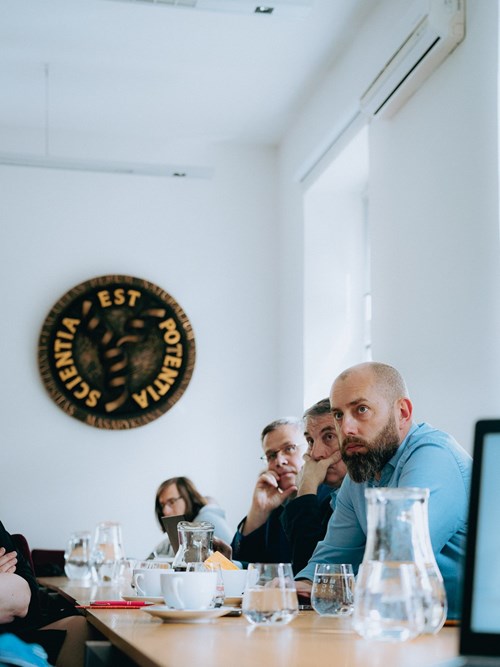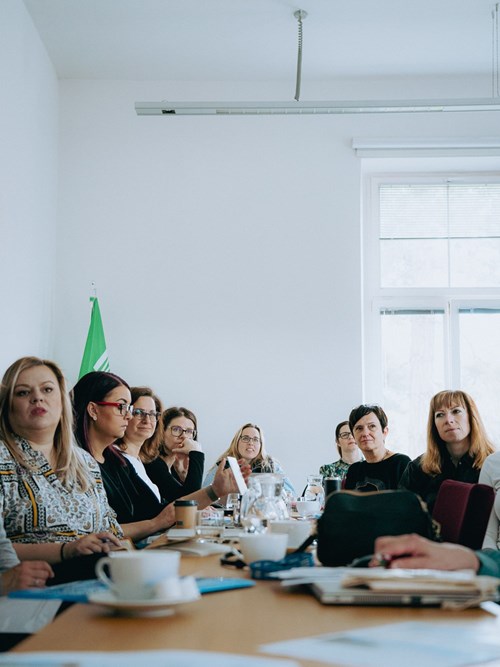What are the biggest challenges in HR management in university environment and how to deal with them?
In my opinion, one of the greatest challenges I face is the career development of research staff within third level particularly regarding career progression of research staff to careers beyond academia. Of course, we all know that more and more PhD students are being conferred and they are moving into universities and research centers as postdoctoral researchers. At the same time the numbers of academic positions are falling. This is a global issue. So what do we do with our brightest and best? It´s important to enable them to discover the full spectrum of wonderful careers that are available beyond academia. So that is a HR challenge in my view.
What does the implementation of the HRS4R bring in this area. How is it important and why?
The Human Resources Strategy for Researchers is an award that is given to universities and research institutes that have reached certain criteria prescribed by the European commission. But for people who are working in HR in universities throughout the European research area the HR Excellence in Research is a very valuable measure which enables HR professionals to introduce innovative and creative training and development practices, better terms and conditions and robust recruitment processes and so on. So for me personally, it enabled me to introduce the Odyssey programme, which enables researchers to progress to careers beyond academia. So it actually helped me to help our research staff, so it´s very important in my view.

New trends include work-life balance. What can universities offer in this area?
I will direct you to the University College Cork´s website Staff Wellbeing and Development, because it´s been very helpful. We have a lot of programmes and we have wellbeing activities, mental wellbeing, physical wellbeing, social, financial, spiritual wellbeing. We have an employee assistance programme and we have a wellbeing and development roadshow. One of the things we also have is the Resource Tree which looks at all of the offerings in UCC, identifying many of the supports that are available. It is very fortunate that there has been a strong commitment from our University Leadership for many years in relation to Staff Wellbeing in UCC as evidenced by the investment in resources which are specifically focused on staff wellbeing. UCC is also proud of being the first university in the Irish State to receive the Keep Well Standard as awarded by IBEC. These offerings really help, because we all have gone through lockdown and now we are coming out of it and it´s really important to have a work-life balance as we transition back to normal, whatever normal may be. So these supports are critical I think to all staff, not just research staff obviously.
How to motivate Early Stage Researchers at the same time? How can universities ensure the retention of scientific talent and how can they motivate scientists for long-term success?
Obviously, a lot of motivation for research happens at local level. Most researchers who come to University College Cork are assigned a mentor, so the motivation piece initially relates to the research and academic experience. From a human resources perspective UCC operates a programme called Professional Skills for Research Leaders. It’s accredited by the ILM and focusses on senior postdocs and research fellows. The programme engages researchers who are just about to become independent and grow their own research teams and groups. There are modules on Leading Research Teams, Developing and Consolidating your research career, and Funding Your Research as well as Communication and Collaboration. It really is helpful, because it enables researchers to understand the systems in which they work and how to use those systems to enable their own research and build their research careers which is what they really want to do. So to sum up you have the academic mentors and then you have HR Research programmes to assist our researchers to take the next step in their career.
How can we increase student engagement in research and what are the best practices for developing student skills?
In UCC I very much deal with the research staff of the University and I don´t have much contact with undergraduates, but I understand that research led teaching is a good way to engage the undergraduate students which gets them to think about research in a real way. In UCC we embed research and innovation into the curriculum in that way students see research results in a real way through lectures. I think that is a really good way to engage students in research.
The Faculty of Science MU has been granted the HR Excellence in Research Award by the European Commission in 2018 and since then it has been diligently implementing a new HR strategy to facilitate the inclusion of the Faculty into the European Research Area (ERA). For example, in setting up effective people care, the Faculty has introduced the consistent use of English as a second language for communication, created a system of positions including competency models, career code specifying conditions for career progression or change, introduced recruitment procedures and an onboarding process for newcomers, which is in the process of digitalization. The Faculty has also unified information security rules and document management rules, actively collaborated within the University to create a gender equality plan, and formulated a strategy for education and support of Early Stage Researchers (PhD students and Postdocs).
Starting in 2020, the Faculty has gradually introduced performance and work behavior evaluation for all employees, except for short-term projects, and is in the process of finalizing employee training and development guidelines, which utilize both University and Faculty training resources and follow recommendations or training requirements arising from annual employee evaluation.
We currently work hard to prepare the Faculty for the Renewal of the HR Excellence in Research Award, with a self-assessment report due in February 2024 and a Site Visit by assessors in the following months.







